The Hall of Heroes: BioShock Infinite's Fort Frolic?
One of the game's most interesting spaces explored. Warning: don't read if you haven't finished the game!
SPOILER WARNING IN CAPITAL LETTERS: Do not read this until you have finished BioShock Infinite. Seriously. This is not a drill. I discuss the ending.
We all went into BioShock Infinite expecting a bit of narrative duplicity - and boy did we get it - but once the frothing waters of the ending had grown still again in my head, the area of the game that left the greatest impression on me was the Hall of Heroes. People who go into these post-Looking Glass games seeking levels they can salute with the same pride as Thief 3's The Cradle or BioShock's Fort Frolic may want to turn their attention here.
The Hall of Heroes is presided over by Cornelius Slate, an archetypal BioShock bad guy. An army man, he hates Zachary Comstock because he sees through his Prophet guise, not to Comstock's racist core, but to a false soldier who lied about this great military history he never really had - including victories at Wounded Knee and in the Boxer Rebellion. Conveniently enough, Booker was with Slate at Wounded Knee and so they can reflect on that conflict together through shouted exchanges as Slate watches Booker's progress from some unseen vantage point, taunting and teasing in comments designed to unsettle Elizabeth, while Booker pleads with him just to hand over the vigor they need to make progress back in the rest of Columbia.
Slate has legitimate grievances, then, but like many BioShock villains he's been twisted beyond repair by events or circumstance - and in this case it's easy to conclude that the Hall itself pushed him over the edge. It's a theme park attraction built to venerate Comstock's brave military history, Hall of Presidents style, in the hope of gently pressing its young men and women into service, and as such Slate lives among statues of Comstock presiding over battlefields Slate believes he never saw. Worse still, Comstock has elevated himself to Commander of the 7th Cavalry in his retelling of events, something even Booker sniffs at.
By the time Elizabeth and Booker arrive, Slate is determined he won't go out and become one of Comstock's "tin soldiers" - partly a reference to the motorised Patriot enemies you come up against here, whom Slate fears joining as an automaton, and the children's toys on sale elsewhere in the Soldier's Field area, and partly an attack on those who never saw combat. The repetition of a simple pejorative fixation is a typical component of the characters who make up philosophical propaganda - Ayn Rand's books are full of objectivists denouncing "looters" - and Slate ticks that box as well. He also wants his men to receive a soldier's death, so he sends them to fight Booker.
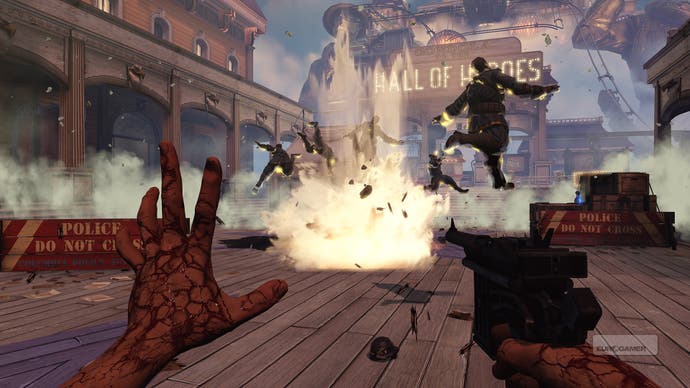
It's compelling stuff when you tour through it the first time. The game's creative director Ken Levine has previously denied that anything in Infinite is intended to be "cute" (although if that NPC at the start of the game called "Mr Rossignol" really is a reference to Rock, Paper, Shotgun's Jim, then I would contest that point), and if you take that claim on trust then perhaps there's something more directly critical about the way the Hall is assembled.
The Wounded Knee and Boxer Rebellion exhibits within the Hall are some of the narrowest, most linear sections of the whole game, and at first it jars slightly, but consider what you're actually fighting through. Medal of Honor-style shooters lazily co-opt real-life conflicts as though they were handy brands to partner with, funnelling you through the richest explosions in battles you don't really understand and only asking you to kill. As you move through painted wooden flames, nailed down foliage and cultural idiosyncrasies borrowed and distorted to fit the exhibit's narratives, ducking and shooting at men in uniform, it feels kind of pointed.
Not least when you consider the battles the exhibits reflect on - Wounded Knee wasn't a famous US victory, it was a massacre of women and children, and the Boxer Rebellion was a politically complex conflict. One of its legacies was the US presidential precedent of sending armed troops into battle on foreign soil without the support of Congress or a declaration of war. I said in my review of Infinite that I felt these elements were handled well and added to Columbia's integrity; I can also imagine they were chosen exactly because they're the kinds of conflict that other war-based shooters happily use as background fireworks without enough thought.
You fight plenty of Slate's men in the Hall of Heroes, but when it comes to Slate himself you encounter him wounded by your long-distance exchanges and you can either kill him or spare him. It's one of the few moments in Infinite where you're asked to present this kind of agency to a world that is otherwise fixed to deliver a particular story. As with the baseball-throwing moment at the beginning of the game, the difference between the outcomes isn't in cool unlockable content (how I have come to loathe this word lately) but within you. If you spare Slate, you find him later in Finkton's underground jail cells, lobotomised and dribbling. I put him out of his misery there. It didn't feel like I was right or wrong in either instance.
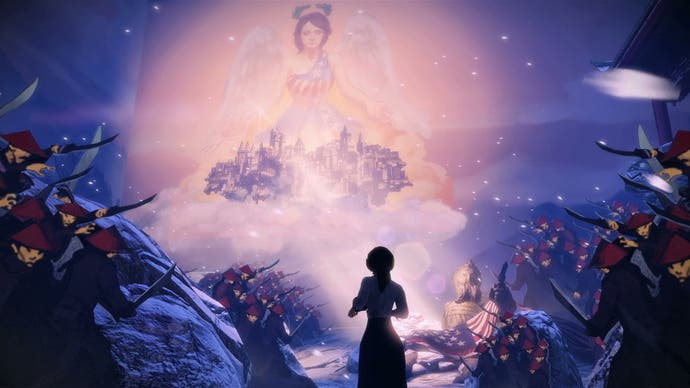
But of course the other great thing about the Hall of Heroes is none of this: it's the impact the game's ending has on events. Infinite eventually reveals that Booker is Comstock, and all of a sudden you want to race through the game again to test it against that claim. There's certainly a lot you have to take on trust - for instance, that the Luteces' multi-dimensional meddling allows for temporal as well as parallel travel, bridging to the days of the Beach Boys, Return of the Jedi and of course Rapture - but I was prepared to forgive a lot after Slate's Hall.
Because, of course, the biggest irony of the Hall of Heroes is that Slate's whole worldview is wrong. Comstock was at Wounded Knee and the Boxer Rebellion. It was only after his baptism, rebirth and ascent to Columbia that he went from hoping to shed the shame and self-hatred of his Wounded Knee experience - still clear in Booker - to distorting it for his political gain, but as a result Slate's hatred of Comstock is at least partially just ignorance that Comstock chose not to correct. Comstock may not have been the Commander, as he says, but as Booker's exchanges with Slate reveal, he had a pretty big role to play.
I only found 70 out of the 80 voxophones hidden around Columbia when I reviewed the game, so perhaps I missed a critical one here - or some other signal - that helped explain Comstock's reluctance to explain himself, or his exaggeration, but I assumed it was all for the same reason that he blamed his wife's murder on his then-servant Daisy Fitzroy or that he pulled Elizabeth through the rift in the first place: he was trying to support his real motives - his fascist aspirations for the future of the world - and also knew they could be derailed if his personal narrative lost its credibility. Dictators who occupy completely contrary points of view simultaneously without batting an eyelid aren't merely the preserve of George Orwell novels - go read some of the statistics underlying the rubbish our political leaders tell us is the truth - and it fits here as well.
I'm sure there's more going on in the Hall of Heroes, too. Sometimes the things BioShock games show you when you dig into them aren't things you agree with - John Teti's conclusion about how the Founders and Vox Populi are presented is an excellent early example, but there will be more - but the fact they are there to divine and debate at all is one of this series' great pleasures.
A few critics have said Infinite may not be as strongly remembered as its predecessors, and maybe not, but I also get the impression that it still has much more to say to those who keep listening.
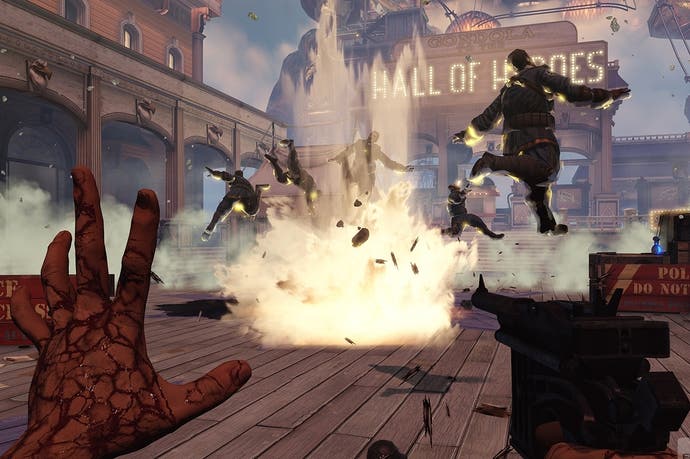


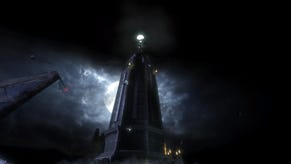
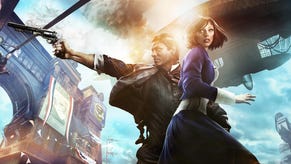
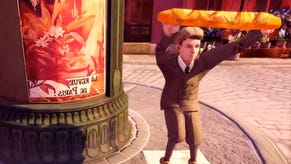


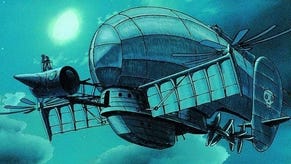
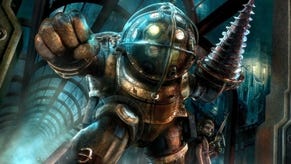

-3-31-23-screenshot.png?width=291&height=164&fit=crop&quality=80&format=jpg&auto=webp)





